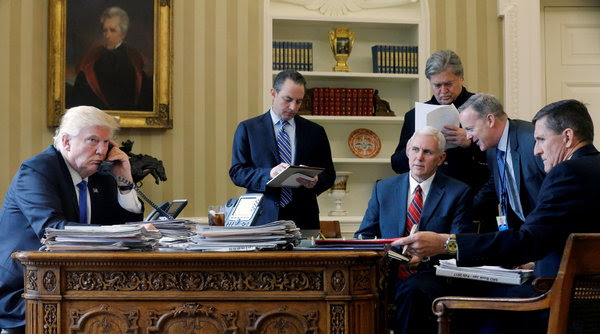
A Yemeni walks past a graffiti protesting US military operations in the country on Jan. 29. (Yahya Arhab/EPA)
The forever war marches on
The first American combat death of the Trump administration came on Sunday in a remote stretch of Yemeni desert. An unidentified service member was killed and four others wounded during a raid by SEAL Team 6 that targeted a senior leader of al-Qaeda in the Arabian Peninsula, or AQAP.
The death brings at least a modicum of attention back to the wars that the United States military continues to fight around the world, even as President Trump’s draconian immigration policies dominate headlines.
Trump often calls out the Islamic State by name as enemy number one, but his administration has been “particularly aggressive on the al-Qaeda threat in Yemen,” writes Nancy Yousseff, BuzzFeed’s national security correspondent. She notes that the U.S. launched at least three airstrikes within the very first hours of Trump’s presidency.
Despite the horrors of the war there (and alleged American complicity in them), Yemen doesn’t usually grab front-page headlines. AQAP, the U.S.’s main foe in Yemen, is not as powerful as the Islamic State, and its ability to engineer strikes against Western targets has been more limited (they have been linked to the Charlie Hebdo and Boston Marathon attacks).
Otherwise, the first days of Trump’s wars around the word look much the same as the Obama administration’s. The U.S. has launched drone strikes against the Islamic State in Libya, and it continues to coordinate strikes in Syria, Iraq, Afghanistan, Pakistan and Somalia. Except for Pakistan and Afghanistan, all of those nations’ citizens are barred from entering the United States per Trump’s executive order on immigration.
Former President Barack Obama ended his eight years in office with just over 15,000 Americans on the ground around the world, down from almost 200,000 at the beginning of his term. But, by using drones in particular, Obama ramped up targeted strikes that many said were imprecise and killed civilians.
With Trump’s recent vow to undertake a “great rebuilding” of U.S. armed services, it’s unclear whether Obama’s strike-based strategy will soon give way to boots on the ground once again. But for now, the action is still in the air. — Max Bearak

White House senior adviser Steve Bannon, standing at right, in the Oval Office while President Trump speaks with Russian President Vladimir Putin on Jan. 28. (Jonathan Ernst/Reuters)
The big question
Signing the refugee ban wasn’t the only big thing President Trump did over the weekend. He also granted Steve Bannon, the White House chief strategist, a permanent seat on the National Security Council. So we asked Philip Rucker, the Post’s White House bureau chief: What do we know about Bannon and the role he’s asserting in national security policy?
“Here’s the thing: In elevating Bannon, Trump gave a political adviser a place at the table where America’s national security decisions are made — at the same time as he demoted the director of national intelligence and the chairman of the Joint Chiefs of Staff. Both figures were regular members of the NSC’s Principals Committee, along with the secretaries of state, defense and treasury. But now they can only attend certain Principals Committee meetings — when, in the words of Trump’s memorandum, ‘issues pertaining to their responsibilities and expertise are to be discussed.’
“Trump says it is part of a broader restructuring of the National Security Council intended to improve efficiencies. But there is no precedent in the Obama or George W. Bush administrations, and Trump’s critics and veteran national security experts were alarmed.
“Trump signed the memorandum finalizing the changes on Saturday afternoon, and by Sunday morning the blowback was intense. Susan Rice, who was President Obama’s national security adviser, tweeted that the changes were ‘stone cold crazy.’
“Bannon is a somewhat mysterious figure within the White House, and a lot of people know one thing about him — that he ran Breitbart, the racially charged and anti-establishment conservative news site. But his life experience is quite broad, both in high finance and as a Naval officer. Trump considers Bannon a savant and is allowing him to shape his presidency and especially his foreign policy. On Saturday, Bannon stood at Trump’s side in the Oval Office as the president spoke by phone with Russian President Vladimir Putin and other world leaders.” |


Interesting idea…the beer halls of Berlin resurredted?
The beer halls of Berlin resurrected? Some how this got trashed by a Troll on first submission : )
The analogy to Hitler is too easy. Trump is a fascist but that covers Mussolini, Xi, Stalin, Thermadorians, Singapore, Duterte, Tojo, Andrew Jackson… Scared yet?